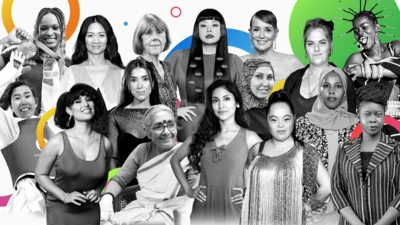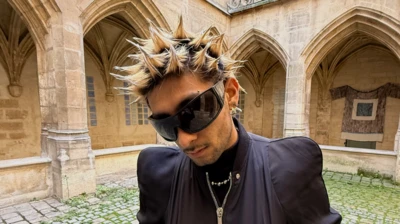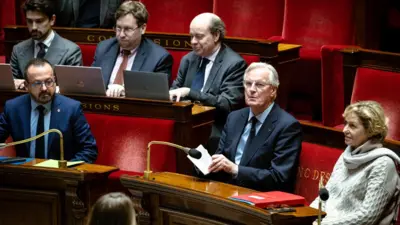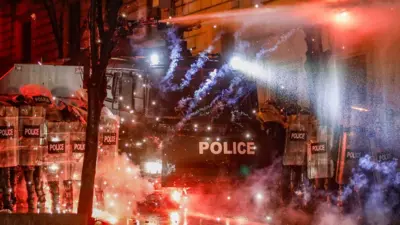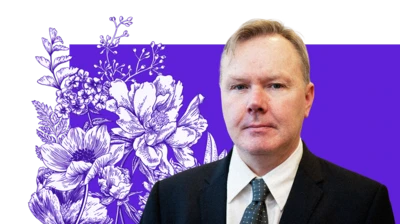We've updated our Privacy and Cookies Policy
We've made some important changes to our Privacy and Cookies Policy and we want you to know what this means for you and your data.
The lexicography of Starbucks
- Author, Jon Kelly
- Role, ґуПуґ«ГЅ News Magazine
An English professor's stubborn refusal to use a coffee chain's terminology has struck a chord around the world. But why are brands so keen to impose their jargon on us?
So, you fancy a coffee. Will that be a caramel macchiato, a double Americano or a white chocolate mocha Frappuccino?
Do you want decaf or regular? Skinny or full fat? Tall, grande or venti?
Ordering a hot beverage used to be straightforward. Now it is turning into a cultural battlefield.
The explosion in coffee chains has meant that Britons who would no sooner consciously learn Italian than cultivate their own arabica beans are finding that terms like latte, barista and con panna are now an integral part of their everyday discourse.
But the first rumblings of a backlash are under way.
English professor Lynne Rosenthal has become a cause celebre after she was thrown out of a New York branch of Starbucks cafe by police for clashing with staff over the wording of her bagel order.
The academic had wanted a plain, toasted multi-grain bagel but said she became infuriated when the server insisted she use the phrase "without butter and cheese".
According to Prof Rosenthal, the exchange proceeded thus: "I yelled, 'I want my multi-grain bagel.'
"The barista said, 'You're not going to get anything unless you say butter or cheese.'"
It seems a bafflingly trivial incident for both parties to get exercised over, and the fact that none of Starbucks' staple product was involved in the contentious order makes one wonder what would have happened had Prof Rosenthal had the temerity to ask for a small white coffee.
But much as we all like to insist that branding has no impact on us, chains clearly would not insist on such precision if they did not believe that terms like "regular fries" generated more revenue than "small chips".
Susie Dent, the resident lexicographer on Channel 4 quiz Countdown, points out that plenty of brand-speak has successfully wormed its way into the English language
She notes that Renault's "Va-va-voom" and Ronseal's "Does exactly what it says on the tin" entered the dictionary after tapping into the popular consciousness - but that sometimes companies which try to impose their buzzwords heavy-handedly very often misjudge their audience.
"I think most of us resolutely stick to small, medium or large; wouldn't we feel too self-conscious to refer to a 'barista'? I would," she says.
"It is every company's dream to get their language out there and being used - it's linguistic product placement. And so the Manhattan scene probably was a reaction, albeit an extreme one, to the jargon imposed on us."
Of course, the purpose of the using language in this way is to burrow into the consumer's subconsciousness with one's own concepts and values.
Brand consultant Jonathan Gabay says carefully-chosen language can make a difference to consumers, but only if it is used subtly.
"The idea is that it's about more than just buying a cup of coffee - you're part of the club, using this supposedly sophisticated language, doing something a bit different," he says.
"The problem is when it's too heavy-handed and and the staff are effectively saying, 'Computer says no.' Marketing is ultimately about communication and some of these companies need to put down the guide books and remember that."
Nonetheless, there is undoubtedly method in Starbucks' approach.
Tony Thorne, King's College London's former language centre head, now a language and innovation consultant and the author of several slang dictionaries, says companies like Starbucks have appropriated the kitchen slang of 1920s New York diners to convey their message of authenticity and good taste.
However, he believes the impact of such marketing techniques is insidious.
"Some of this stuff is ludicrous in its complexity," he says. "They're not trying to turn us into food snobs - it's simply about imposing their brand values.
"It's intended to bamboozle and intimidate. I see it as a form of corporate bullying."
For their part, Starbucks have insisted that there "are no rules and customers have always been able to ask for drinks any way they want".
That'll be an ordinary white coffee over here, then. Hold the froth.
Top Stories
More to explore
Most read
Content is not available
